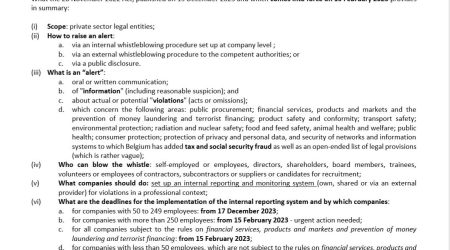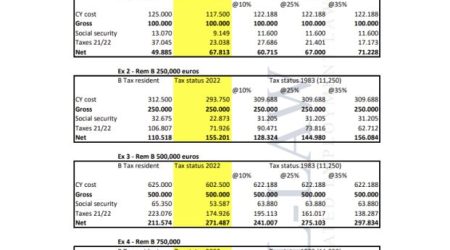Our latest DEL-Law newsletter re the reform of the Belgian labour market (New deal) in effect on 20-11-2022
Posted the 3 December 2022Our latest DEL-Law newsletter re the reform of the Belgian labour market decided by the Belgian government on 15 February 2022 and implemented by the law of 3 October 2022 entering into force on 20 November 2022 including the move to 4 workdays/week (on a voluntary basis) . A summary of the various measures and their main features and terms.
The law (L.) of October 3, 2022 implementing all measures decided by the core cabinet on February 14, 2022 with a view to (i) ensuring a labor participation rate of more than 80% and (ii) improving the flexibility of the labor market entered into force on 20 November 2022 (except for some provisions), i.e. 10 days after its publication in the Belgian Official Gazette, and includes numerous measures that have an impact on Belgian labor law.
These measures can be summarized as follows:
(i) communication of flexible working hours – art 6 §1 1* L. of 8 April 1965 : in terms of part-time work, flexible working hours must be published 7 days in advance rather than five (minimum 3 days in advance by Sector CLA rather than 1 and 3 days for JC302 and 110 with transitional rules under JC 145, 121 and driving schools). The work regulations must be updated within 9 months;
(ii) in terms of working time, two measures:
a. 4-day week – art 20bis/1 L. of 16 March 1971: full-time work may be done over 4 days instead of 5 at the rate of:
i. 9h30 per day in 38h regime;
ii. ¼ of the weekly working time of more than 38 hours (max 40) if a CLA provides for it;
The conditions in brief:
- the worker must make a request in writing (email, letter) – so it is an option and not a right;
- the employer can accept or refuse but by justifying his refusal in writing within one month of the request - motivation not defined in the law but a priori (preparatory works) based on the needs of the function, the continuity of the service or the organization;
- an agreement must be concluded setting the terms (beginning and end of the day, time and duration of rest, regular break days) with a copy on request to the CPPW or, failing that, to the union delegation;
- no overtime;
- level 2 sanction (to be multiplied by the number of workers) in the event of non-compliance with the publication and storage formalities;
- obligation to keep the application and the agreement for 5 years (and at the location of the work regulations during the measurement);
- protection against dismissal and no unfavorable treatment;
Note:
o the use of a 4-day week at 38 hours per week (therefore a little more than 9 hours per day) has existed since 2001 but as a collective measure;
o the measure has been the subject of considerable criticism because it places employers in a position of permanent negotiation with their workers, with the obligation to justify any refusals, a lack of flexibility in terms of overtime, an arsenal of sanctions that testify to a deep distrust of them;
o the National Works Council will evaluate in two years;
b. alternating week - art 20 quater §1 L. of 16 March 1971: the worker who so wishes may ask to work a number of weekly hours that is no longer fixed but variable - plus one week and minus the following week per period of two weeks (4 weeks on derogation if an unforeseen event on the part of the worker);
The procedure and conditions (request, refusal) are identical to what is provided for the 4-day week, including the prohibition of overtime during the week of reduced services;
(iii) individual right to training:
a. 4 days in 2023 and 5 days in 2024 for companies with more than 20 (1 between 10 and 20);
b. through an annual training plan submitted by each company with more than 20 workers;
(iv) right to disconnect – art 16 L. of 26 March 2018 : in companies with more than 20 workers, a CLA or, failing that, the work regulations must provide for (as from 1 January 2023):
a. the practical arrangements for the application of the worker's right not to be contactable outside working hours;
b. the instructions relating to the use of digital tools which ensure that the worker's rest periods, holidays, private and family life are guaranteed;
c. training and awareness-raising actions for workers and management staff on the rational use of digital tools and the risks associated with excessive connection;
the law does not lay down the procedures to be adopted, but according to the preparatory works, we can draw inspiration from the French example and it can be instructions for not answering emails or calls, standby devices computer servers outside working hours, activation of absence and redirection messaging, use of an automatic signature indicating the non-imperative nature of an immediate response, etc.;
disconnection is impossible in certain sectors such as the health and safety sectors
(v) support for the dismissed worker with two measures:
a. transition route – art 37/1 L. of 3 July 1978: as part of a transition route, the worker may ask to work for another employer during the notice period under the following conditions:
i. written agreement;
ii. maximum duration according to AR;
iii. employer pays the remuneration with compensation by the user;
iv. user must engage under CDI or pay an indemnity of 50% of the duration of the transition journey;
v. resumption of seniority under the new contract;
b. redeployment – art 39ter 3 July 1978 - access to redeployment measures in the event of a long notice of more than 30 weeks;
(vi) the "night" hours will start counting at midnight and no longer at 8 p.m. for the e-commerce sector - a measure already adopted previously;
(vii) platform workers :
a. better protection for platform workers, particularly for accident and health insurance (date to be set); and
b. nature of the relationship – art 332 L. of 27 December 2006 : 8 new specific criteria will be added to the 2006 law with a refutable presumption that the platform worker is a salaried worker if 3 criterion out of the 8 (or 2 out of the last 5) are met (as from 1 January 2023).
The FEB and Agoria as well as several political representatives have already criticized some of these measures, notably by regretting placebo measures and the lack of financial incentives to work as well as possible organizational difficulties for employers arising from a vision paternalistic, rigid and overprotective demonizing employers and forcing them into permanent negotiations. Others mention increased risks of burnout (given the heavy schedules) or the fact that only a small part of the workers will really benefit from it.
Related articles

DEL-Law Newsletter - the Belgian legislation on the protection of whisle-blowers.
Our latest DEL-Law newsletter (in Fr, Dutch and Eng) re the complex and burdensome new procedure for the medical Act of God (Force majeure) in effect since 28 November 2022. With a summary of the main features of the said procedure. A must known for 2023..
